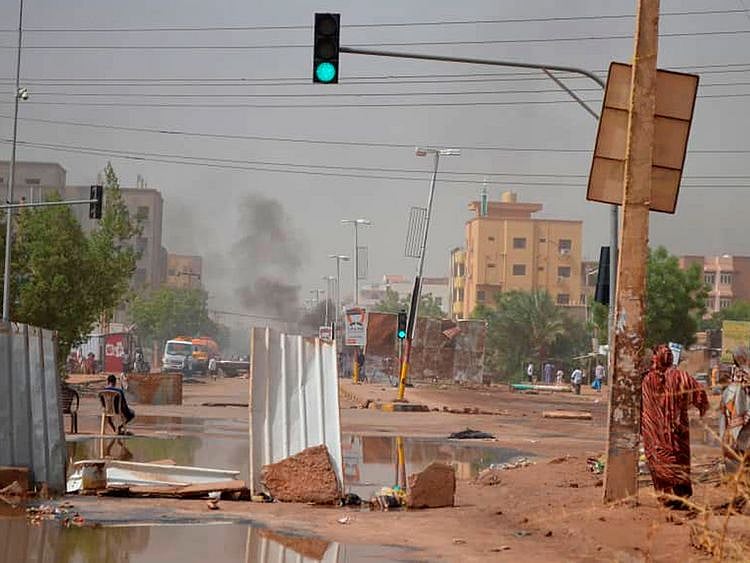Ethiopian PM to mediate between Sudan's military and protesters - diplomatic source
Sudan denies more than 100 killed in protest crackdown

Also In This Package
Cairo - Ethiopian Prime Minister Abiy Ahmed will visit Khartoum on Friday to mediate between Sudan's military rulers and an opposition alliance over a transition to democracy, a diplomatic source at the Ethiopian embassy in Khartoum said.
The source told Reuters that Abiy would meet members of Sudan's Transitional Military Council and the opposition's Declaration of Freedom and Change Forces (DFCF) during his one-day visit.
Sudan denies 100 killed in crackdown
Sudanese authorities admitted dozens of people were killed in a crackdown on protesters but denied doctors' claims the death toll has topped 100, as heavily armed paramilitaries guarded the tense capital.
Members of the Rapid Support Forces, who rights groups say have their origins in the Janjaweed militias of Darfur, were on the streets of Khartoum on Thursday in pick-up trucks mounted with machine guns and rocket launchers, witnesses said.
It follows a raid by security forces Monday on a long-running sit-in outside the army headquarters that marked the start of a brutal crackdown on demonstrators demanding civilian rule.
The committee, which is close to protesters and relies on doctors on the ground for its information, warned the figure could rise.
Some life had returned to the streets of the capital on Thursday, with limited public transport operating and only a few cars on the roads.
A small number of shops and restaurants were open on the second day of the Eid al-Fitr holiday.
But there was still widespread disruption around the capital.
At Khartoum's airport relatives of travellers stayed late into the night waiting to see if their flights would arrive, following a slew of cancellations over the past few days.
Internet blackouts continued to beset the city.
The military ousted longtime president Omar Al Bashir in April after months of protests against his authoritarian rule, but thousands of demonstrators had remained camped out in front of the army headquarters calling for the generals to cede power to civilians.
Despite several initial breakthroughs, talks between the ruling military council that took power after Bashir's ouster and protest leaders reached a deadlock over who should head a new governing body.
On Monday, security forces moved in to disperse the weeks-long rally outside the army headquarters.
As international condemnation mounted, the health ministry said "no more than 46" people had been killed in "recent events".
'Extreme caution'
The United Nations and the British embassy announced they were pulling non-essential staff from Sudan, and the United States warned its citizens to exercise "extreme caution" amid the ongoing uncertainty.
Despite the heavy presence of security forces on Khartoum's main streets, the groups that spearheaded the demonstrations against Bashir made a fresh call on Thursday for civil disobedience.
"The revolution continues and our people are victorious despite the terrorism and violence of the militias," the Sudanese Professionals Association, the group that initially launched the anti-Bashir campaign, posted on Twitter.
It urged an "indefinite strike and civil disobedience," warning against calls for violence.
In the northern suburb of Bahri, connecting and smaller roads in the neighbourhood were blocked by protesters putting up makeshift barricades made from rocks, bricks and tree trunks.
The protesters blamed the bloody crackdown on the "militias" of the military council.
The Rapid Support Forces have been singled out by protesters.
Heavily deployed in the streets of the capital, some residents seemed wary of the paramilitaries as they moved around the streets.
RSF commander Mohamed Hamdan Dagalo, widely known as "Himediti," said he was on the side of the "revolutionaries," but warned he would not "allow chaos," referring specifically to the barricades put up in some neighbourhoods.
The ruling Military Council issued a statement hitting out at the "campaign organised on social media aimed at spreading lies and fabricating accusations."
It claimed the RSF "refused to carry out the orders of the former regime to expel demonstrators from the sit-in by force."
The armed forces also issued a statement urging citizens to stay away from military sites, without giving a reason.
African and Western governments have been strongly supportive of the protesters but Arab governments, led by Saudi Arabia, have backed the military rulers.
The United Arab Emirates urged resumed talks to "realise the aspirations of the brotherly people of Sudan," echoing a call by its ally Saudi Arabia a day earlier.
Sign up for the Daily Briefing
Get the latest news and updates straight to your inbox
Network Links
GN StoreDownload our app
© Al Nisr Publishing LLC 2026. All rights reserved.